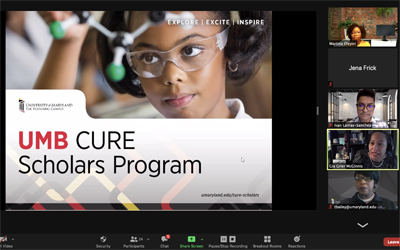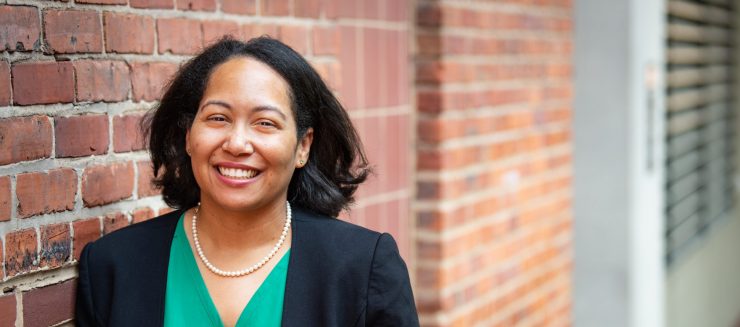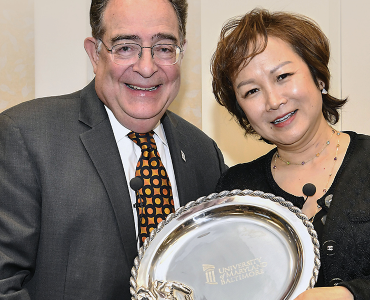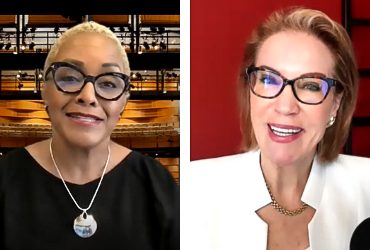Tyler McKenzie joined the University of Maryland, Baltimore (UMB) CURE Scholars Program in 2015 as a member of the first cohort of sixth-grade students ready to learn and take on new challenges. Now, McKenzie is an 11th-grade student at Green Street Academy with plans to pursue a career as a neurosurgeon.
“CURE has given me a lot of experiences and opportunities to learn and meet professionals involved in the medical field, so I feel ready for what comes next,” he said.
On Feb. 27, McKenzie and the rest of the scholars in his cohort officially entered the last leg of the CURE Program with the launch of the Career Navigator Program. This final piece of the pipeline is specifically geared toward 11th- and 12th-grade students as they fill out college applications, apply for scholarships, and make professional connections to help them secure internships and other educational opportunities.
“Today is a milestone for us,” Gia Grier McGinnis, DrPH, MS, executive director of the CURE Scholars Program, said during the launch event. “These scholars have been with us since they were in sixth grade, and that’s quite an accomplishment. Year after year, they have continued to make a renewed investment in themselves and in their futures.”
The mission of the UMB CURE Scholars Program is to prepare West Baltimore students for careers in the health sciences and cancer research. This groundbreaking National Cancer Institute-funded program was the first of its kind in the nation to introduce a STEM (science, technology, engineering, and math) pipeline as early as sixth grade. When the scholars reached high school, the program expanded by adding a high school component called CURE Connections (C2), which is geared toward ninth- and 10th-grade students. Now that the Cohort 1 scholars are in 11th grade and on the verge of applying to colleges, the CURE Program has expanded again with the Career Navigator Program.
“The reason why this last piece of the program is so important is because our scholars come from underrepresented, minority communities, and many of them are going to be the first in their families to pursue higher education,” said Martina Efeyini, MS, the college and readiness coordinator and AmeriCorps VISTA volunteer for the CURE program.
Efeyini and her colleague, Ivan Lamas-Sanchez, MA, program manager for student scholar success, worked together to plan a launch event to welcome the scholars and mentors to the Career Navigator Program.

Due to COVID-19 safety regulations, the scholars held the new program’s launch virtually over Zoom. The launch began with a keynote address from Ryan Richardson, PhD, a biomedical engineer who is completing a postdoctoral fellowship at the University of Maryland School of Medicine. Richardson also is an American Academy for the Advancement of Science (AAAS) fellow, which is a nationally competitive fellowship. He is a member of AAAS’ Science, Technology, Engineering, Arts, and Math (STEAM) Affinity group, which is what connected him with the CURE program. He talked to the scholars about his academic and professional experiences and impressed upon them that everyone’s path to success is different.
“The lesson I learned is that life is an unexpected journey,” he told the scholars. “The way to get to a career in science might look different for a lot of different people, and no matter what your journey looks like, you shouldn’t forget to have fun along the way.”
After the keynote address, the scholars and mentors split into breakout rooms to participate in a poetry slam workshop led by Joseph Green, a spoken word artist and speaker. Efeyini thought this would be a great way for the scholars to feel connected, not just to each other, but also to their mentors.
“I was trying to figure out a way where we can make the launch feel exciting, especially in a virtual space,” Efeyini said. “During the pandemic, we’re all going through a lot of difficult things and a lot of trauma. As scientists and very right-brained individuals, we often don’t talk about our feelings and we don’t share intimate and vulnerable things. A poetry slam is very intimate, and this will hopefully help to introduce a sense of culture and community bonding and really show what the heart of the CURE program is.”
One-on-One Mentoring
In small groups, the scholars and mentors were given a list of words. From those words, they selected 15 of them to arrange into a poem that described their shared experiences. At the end, each group had a chance to present their poems.
“It was cool getting to talk and share about my experiences,” McKenzie said. “It felt a little bit shaky here and there, but then we all got together. It’s funny because I wasn’t expecting it to be a good experience, but I loved it.”
This also was a great experience for the mentors, some of whom are just joining the program this year as a Career Navigator mentor. In this new role, the mentors will participate in a virtual speaker series to help the scholars learn more about different STEM career fields and opportunities.
This mentorship role also will open up doors to summer internship opportunities for the scholars. The summer between their junior and senior year of high school is the most important, as this is the last opportunity for the scholars to add a professional internship to their resumes before applying to colleges in the fall.
“We are looking to the mentors to help the scholars complete their journey,” Grier McGinnis said. “The scholars will have to make several life-changing decisions in a very short time frame, so we’ll be looking to our Career Navigator mentors to help them process all the different options they’ll have, as well as share with them the importance of why they need to start building a professional network.”
The mentors and CURE staff also will help the scholars build individual portfolios of their work and physical evidence of what they have learned over the last 5 1/2 years. This includes all of their research posters, STEM projects, and the awards and accolades they have received.
“We want our scholars to feel prepared and excited about their collegiate experience,” Lamas-Sanchez said. “The biggest thing I want them to take away from this is that there’s always going to be people who are willing and ready to help.”
If you’re interested in becoming a mentor for the Career Navigator Program, you can submit your application here.




